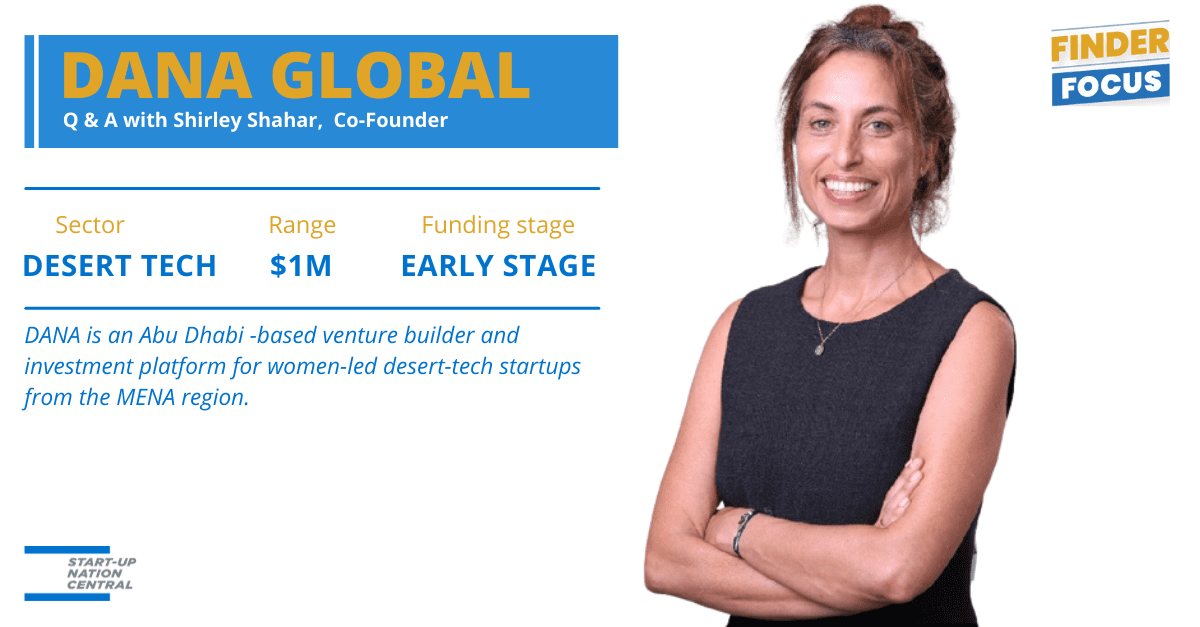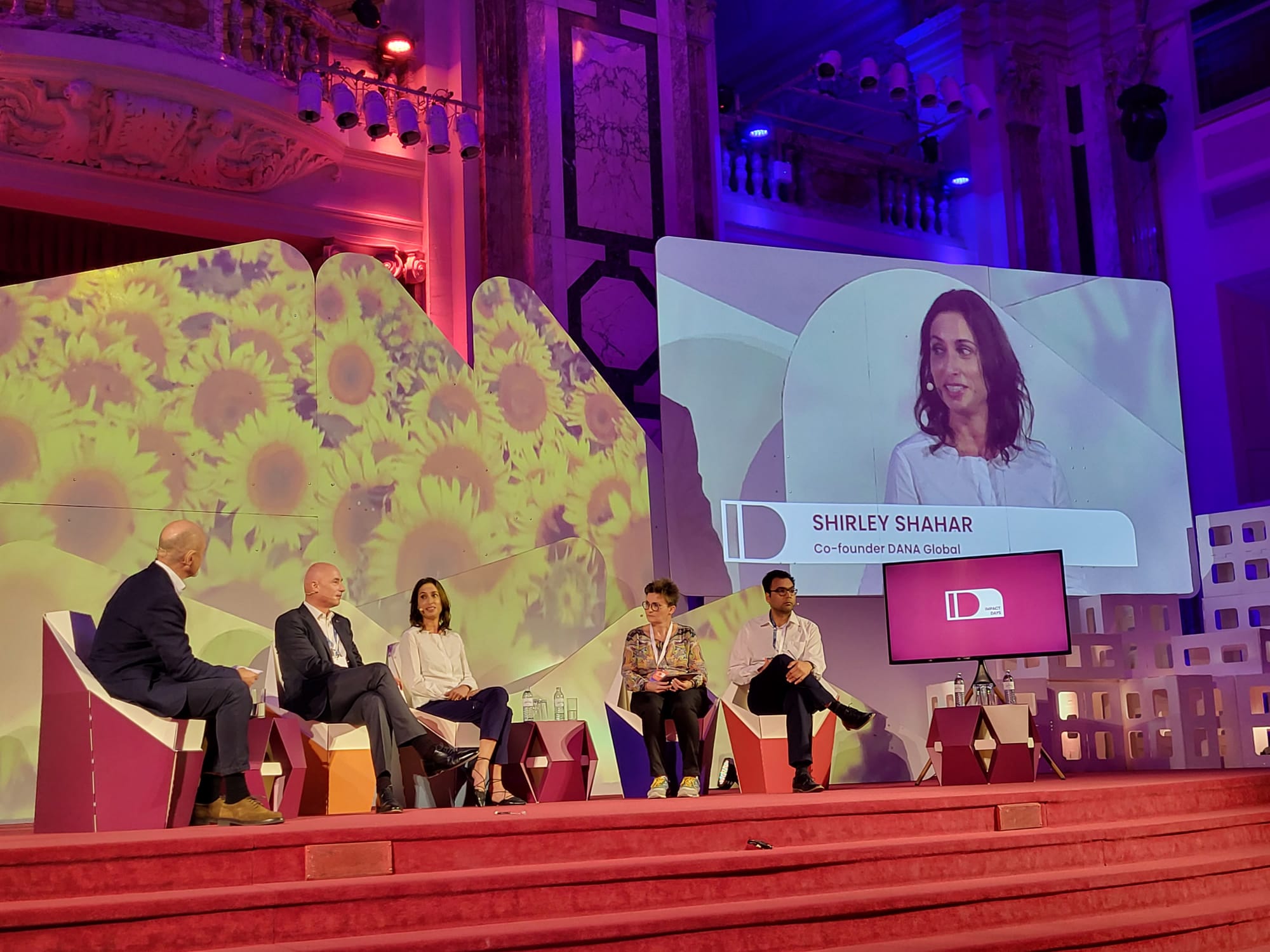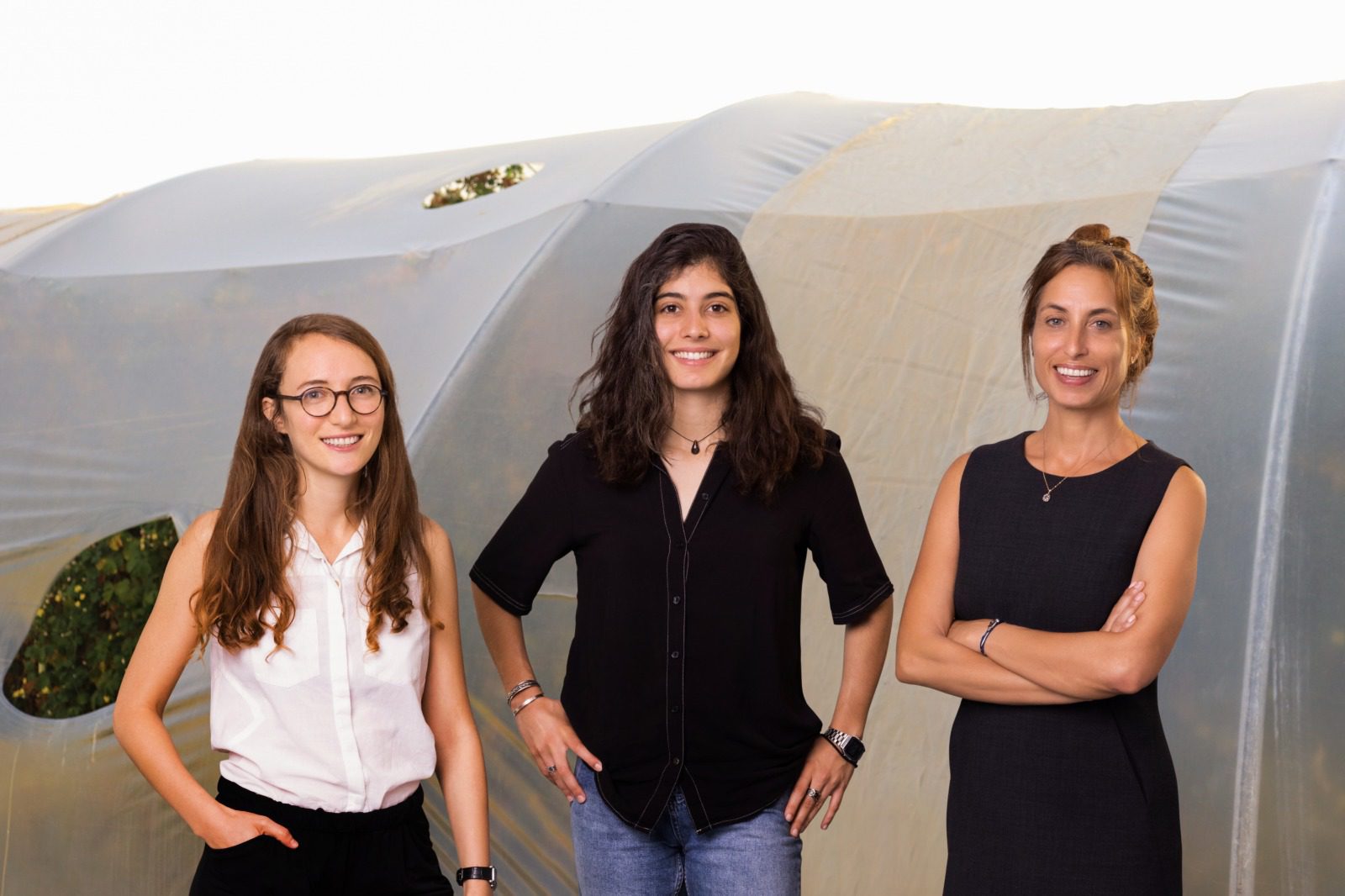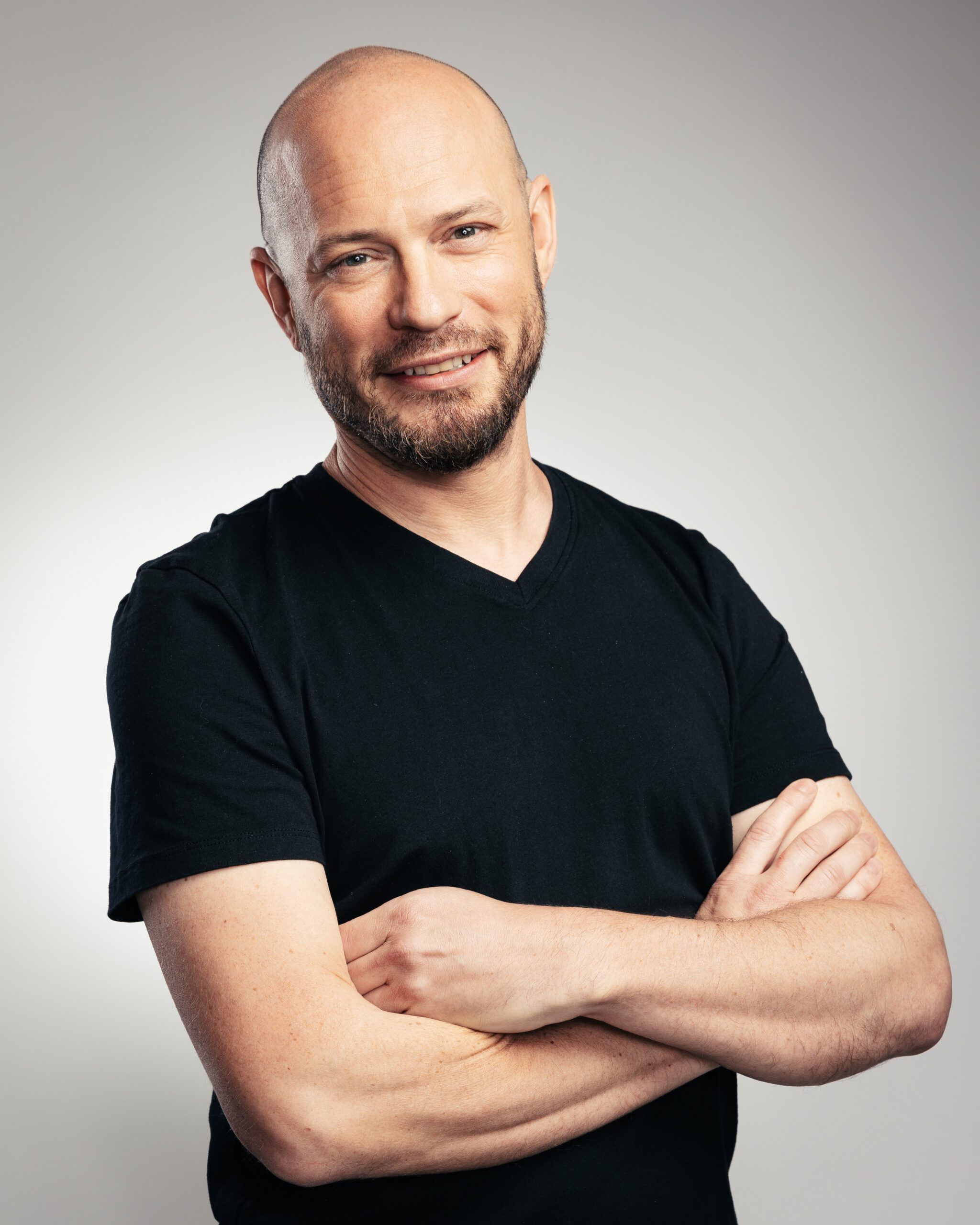
DANA Global is an Abu Dhabi-based venture builder and investment platform that supports women-led startups in Desert-Tech, including AgriTech, FoodTech, water solutions, renewable energy, and circular economy. Its program emphasizes the importance of diversity in innovation, empowering women from across the MENA region who generate unique sustainable tech based solutions. Start-Up Nation Central sat down with Shirley Shahar to hear her story and vision.
We are focused on individual startups, not entire cohorts: there is no “one size fits all” approach for our startups.
Start-Up Nation Central: Could you describe what a venture builder is and how it’s different from an incubator or accelerator?
Shirley: Our venture builder acts like a co-founder of the startup to assess what is really needed and execute that in a quantifiable, practical way. Once the startup founders meet the investment committee and we decide it is a good fit, we create KPIs that we feel are needed in order to advance the company for the following investment stage.
A big part of our partnership is meeting these milestones and building our partnership on tangible successes: marketing or finance models, networking in the MENA region, resolving product issues, or even building teams in the startups. That is really the difference between a venture builder and an incubator, the bespoke nature of our engagement, and our skin in the game. Also, we are focused on the individual startup, not an entire cohort, which allows us to take a more boutique approach: there is no “one size fits all” for our startups.
Incubators and their workshops tend to focus more on the ideas surrounding the startups. That’s great, but startups need a lot of ground-level assistance. Accelerators are a bit different but still serve cohorts, so there isn’t enough attention given to the individual startup and its needs.

Shirley Shahar presenting DANA’s case in “investing in peace” , Impact Days, Vienna, 2022
We were here before the Abraham Accords were even implemented.
Start-Up Nation Central: How did you get to the UAE and build your program over there? A few years ago it would have been very difficult for you to be there and do this work.
Shirley: We were here before the Abraham Accords because our company is a regional entity, and its strategy is rooted in opportunities that can be found in the MENA region. When we started to work on the idea of supporting solutions for the desert, we saw that desertification is something that’s happening all around the world and that there are specific concerns in tech, such as agritech and FoodTech, that can be employed to address it. The massive opportunities for these sectors are increasingly located in the developing world.
A few years ago, the tech industry was focused on FinTech, eCommerce, and Cybersecurity, but nowadays food and water are becoming pressing issues that we can no longer ignore. We see climate change as a strategic opening for the agrifood and ClimateTech sectors. The MENA region is the perfect place to bring the Israeli staple of innovative agriculture. We share the same limitations and climate, and the region seems eager to catch up to Israel in this regard.
The MENA region is the perfect place to bring the Israeli staple of innovative agriculture.
Start-Up Nation Central: How are the MENA and Israeli ecosystems being linked?
Shirley: MENA is a traditional market. Farmers here often work in the same way they worked 50 years ago, but they know this is not sustainable. They know they need to be more productive in exporting to the European markets, and are experiencing the effects of climate change in their work. They register a sense of urgency as they notice how climate change creeps up and begins affecting their farms and livelihoods. This is a very relevant area for these ecosystems to converge on and for tech to supply much-needed solutions. We were looking at this two years ago, and while it may not be as glamorous as the cybersecurity trend, these are technologies that will be used for decades after implementation and are more dynamic and impactful in my opinion.
Start-Up Nation Central: Tell us about your personal history and why you became passionate about food sustainability?
Shahar: I started in advertising and marketing, and then moved to agriculture. While working at Agrexco, I met many farmers who worked in the desert. Twenty years ago, Israel was exporting fresh produce and it was a big part of the economy. Much of the produce was actually from the desert, from very innovative farmers who were passionate about working with the land in a sustainable way and who saw the desert as an opportunity and not only as a challenge that needed to be overcome. I was relocated with family, several times, first to Bangkok, then to Singapore, then to Rome, and finally to Boston, where I was able to take classes at Harvard and MIT focused on innovation and technology. When Zada Haj, a Palestinian Israeli colleague, came to me and wanted to do something in memory of our friend Dana Salah, an entrepreneur and engineer from Ramallah, who died in a car accident, I thought it was a good time to start working towards this dream of connecting desert to innovation. That’s how DANA Global was born.
“… diversity and inclusivity became an important element of DANA”
Katie Wachsberger, our COO, who has been working in the GCC for over seven years, partnered with Zada and me, and together we established the venture builder in Abu Dhabi. The diversity of the team happened organically but we worked so well together that diversity and inclusivity became an important element of DANA‘a culture. Abu Dhabi was chosen as the home for our venture builder because it is a hub for the entire MENA region. Its rulers have also demonstrated a serious commitment to catalyzing a regional movement toward policies around food waste, food security, circular economy, and sustainability.
Start-Up Nation Central: DANA’s center in Israel is in the south of Israel. Why did you choose this location?
Shirley: I had already worked in the Arava and the Negev, and was familiar with the potential it presented for our initiative: while it’s very beautiful, it’s not an easy place to live, so the people there have a close relationship that isn’t based strictly on business, but on empowerment of the entire community. There are farmers there that have been working in agriculture in very innovative and creative ways for decades now, making it a strategically perfect choice for DANA. The Israeli desert is a living success story for the verticals we work with.

AgriFood-Tech is fundamentally different from cybersecurity or fintech – these are physical products that are connected to physical issues
Start-Up Nation Central: Tell us about the process of how DANA works with startups and their products.
Shirley: First of all, it’s important to note that AgriFood-Tech is fundamentally different from Cybersecurity or FinTech. It isn’t like writing code that can be iterated on and adjusted – these are hardware-based products that are connected to physical issues, so they aren’t easy to change once the product is finalized. Such pivots are generally quite costly, and of course, we are trying to optimize the use of time and capital with our startups. At the very beginning of any partnership, we take the product to the field to test the feasibility on a technological level and from the point of view of the consumer (farmers, packaging houses, etc). We take the product to our network of farmers, greenhouses, agronomists, and other corporate design partners. This gives us a very good idea of how to work with the product and whether it will actually take hold in the market. Sometimes a startup has an excellent idea that will not work because it’s too expensive for the farmers to implement. When I come to investors and tell them that the product will work in the market, it’s because we’ve checked. DANA’s startups are practical and strategic on every level because of this approach.
Start-Up Nation Central: How are you partnering with the UAE?
DANA is a UAE-based entity registered in Abu Dhabi Global Market., Additionally we have partnered with Masdar City, a Mubadala-owned company that supports sustainability and innovation in Abu Dhabi. DANA is building the first AgriTech early-stage pilot facility in Abu Dhabi. It’s a small site but gives us a space to test products from all over the MENA region, including Israel. The second important part of this partnership is that we are also able to work with local farmers in Abu Dhabi. There is a very strong network of farmers who can work with our products while still in beta so they can be perfected and brought to market. We are also working on creating three more beta sites, including in KSA, Morocco, and Egypt.
Start-Up Nation Central: What does success look like for DANA?
Shirley: Success for us is our startups scaling up in MENA with corporate and government partners and notable exits in the region. Continuing to promote success among women-led startups, and bringing their solutions to fruition in impactful ways also provides a sense of achievement. That’s the vertical that we believe in the most and I believe that this strategy will come to fruition within the next year.
DANA is an ambassador of goodwill, good technology, and good business practices. On a day-to-day basis, we are just doing business, so the impact comes organically.
Start-Up Nation Central: Collaborating with states in this region is sort of historic. Do you feel like you are a sort of ambassador for Israel?
Shirley: I feel that DANA is an ambassador of goodwill, good technology, and good business practices. But on a day-to-day basis, we are just doing business. The impact comes organically.
For instance, we were working with a solar startup in Gaza a year ago that was simply an amazing group with a great product. A few months ago, there was a terror attack in Tel Aviv, and the startup founder was the first person to check and make sure that my kids and I were okay – before my mom even had a chance!
This human moment was significant for me; at the end of the day, DANA is making a platform that creates dialogue and connections between people around a shared vision. I think small stories like ours are what will really add up and have the biggest impact.
Start-Up Nation Central: What are you looking for moving forward?
Shirley: We want to make sure that our investment platform is completely funded by 2023, but it’s important that our investors are diverse and passionate about creating connections between both people and peoples. I’m very proud that we were able to get a Palestinian-Israeli investor, that we are creating more partnerships in the UAE, and that we are onboarding investors from the EU – all crucial parts of diversifying our partnerships globally.
Start-Up Nation Central: What do investors around the world need to know about Israel?
Shirley: The quiet verticals will have the most impact moving forward: AgriTech, FoodTech, etc. Sustainability is the future, and Israel is leading the way.
Start-Up Nation Central: Any recommendations for people coming to visit Israel?
Shirley: The beach is an amazing place to relax, but I found my secret places on the beach, that allow me also to do work; I recommend the beaches further south in Tel Aviv, closer to Yafo. And you have to try Asif Cafe!
Start-Up Nation Central: Any recommendations for fledgling entrepreneurs?
Shirley: Get good investors that trust you. Be patient and above all trust the process. Know your timing. You’ll know when the time is right for you. Be attentive to the ecosystem that you are interested in and always try to find people that you will love working with.
Click here to learn more about Dana Global on Start-Up Nation Finder.

Phillip Stark is the Marketing Manager for Start-Up Nation Finder at Start-Up Nation Central Finder is provided courtesy of Start-Up Nation Central, a non-profit organization that strengthens Israel’s innovation ecosystem and connects it to global challenges and stakeholders.
